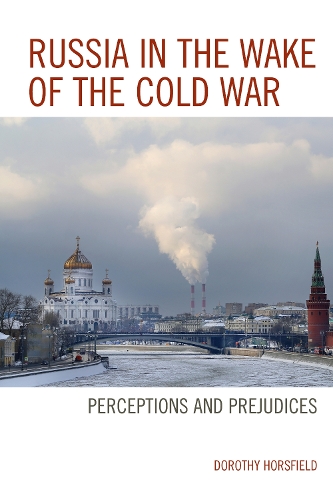
Russia in the Wake of the Cold War: Perceptions and Prejudices
(Paperback)
Available Formats
Publishing Details
Russia in the Wake of the Cold War: Perceptions and Prejudices
By (Author) Dorothy Horsfield
Bloomsbury Publishing PLC
Lexington Books
11th February 2020
United States
Classifications
Professional and Scholarly
Non Fiction
Politics and government
Regional / International studies
International relations
947.086
Physical Properties
Paperback
232
Width 155mm, Height 222mm, Spine 17mm
349g
Description
Amid widespread and increasing alarm in Western strategic and foreign policy circles following Russias capture of Crimea, support for rebels in Ukraine, and military intervention in Syria, this study provides a timely and sophisticated analysis of the nature and intentions of post-Soviet government under President Vladimir Putin. Based on both Russian and non-Russian sources, this book examines the enduring Cold War legacies underpinning Western perceptions of contemporary Russia. It analyzes the ways in which the West has interpreted and reacted to Russias domestic authoritarianism and foreign policy behavior and argues for diplomatic engagement based on liberal pluralism.
Reviews
This is a broad-ranging and challenging analysis of the travails of liberal pluralism during the Cold War and after. It provides an original, stimulating, and idiosyncratic intellectual history of contemporary Russia and its interactions with Western intellectual traditions. Covering a wide cast of thinkers and issues, an interesting read is guaranteed. -- Richard Sakwa, University of Kent
This is an innovative, engaging, and sophisticated book. By examining the basis of what has been called lazy Putin-bashing and the ill-informed adulation of todays Russian leadership, it is also a timely one. With a cast of characters ranging from the liberal icon Isiah Berlin to Russias neoconservative strong man Aleksandr Dugin, the reader is both challenged and surprised. Dorothy Horsfields wide-ranging interdisciplinary consideration of the divisive claims and counterclaims of new Cold War Warriors and re-invented fellow travellers is sure to be controversial in the best tradition of incisive scholarship. -- Paul Pickering, Australian National University
In this wide-ranging, thought-provoking, and controversial analysis, Dorothy Horsfield examines the debates on the nature of Russianot only among Westerners, but also among Russian intellectuals themselves from the nineteenth century to the present. Influenced primarily by the Cambridge school of political theory and Isaiah Berlins approach, Horsfield opts for an interdisciplinary discursive strategy that ranges from historical narratives to biography and social theory and sets all writers in their social context, rather than for a narrow, overly structured research methodology. This yields a richer analysis and more interesting read than a rigidly systematized pseudo-scientific approach could ever do. This study succinctly and clearly reminds us that many of the largely accepted truths about Putin and contemporary Russia need at least to be questioned. -- Leslie Holmes, University of Melbourne
The book by Dorothy Horsfield is a graphic illustration not only of the apparent pluralism of contemporary political thinking in Russia, but also of the deep historical roots that modern Russian intellectual paradigms have. The fight between liberalism and conservatism, between modernizers and traditionalists, between Europe and Eurasia as the preferred focus of Russias aspirations did not start yesterday and will not end tomorrow. One can only hope that these clashes of minds will take a more benign and mutually respectful form than we often see today in Russia. -- Andrey Kortunov, Russian International Affairs Council
Author Bio
Dorothy Horsfield is a visiting fellow in the College of Arts and Social Sciences at Australian National University.
